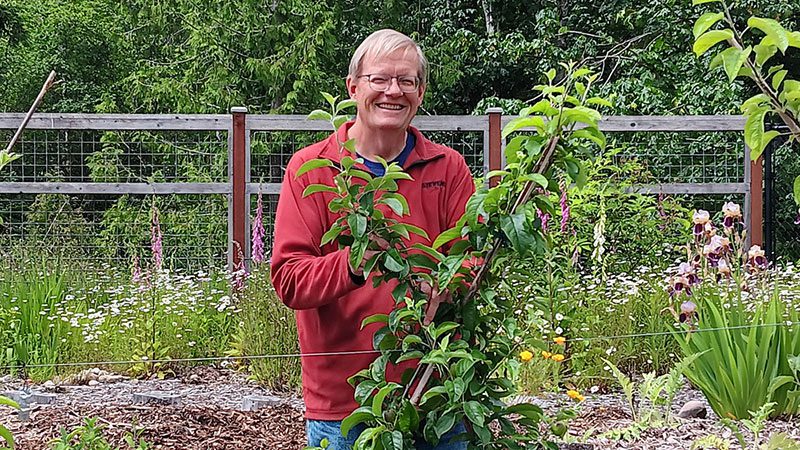My Tilth-fueled Life
By Bill Thorness, guest contributor

As a kid on a North Dakota wheat farm, I didn’t imagine that agriculture or organic gardening would hold me in thrall. But when I moved to Seattle for work after college, I saw the mild, green climate, and thoughts of growth just sprouted.
My first job sent me headlong into rural agriculture, and sideways into its urban cousin.
In 1985 I was hired as the assistant editor and sole reporter for The Grange News. It was a monthly newspaper for rural folks who belonged to the fraternal Grange organization, a Masonic-styled group for farmers. I’d travel the state writing about rural and farm issues, then return to Seattle and to my P-Patch. I realized a number of those Grange farmers’ children also had moved to the city. So we started Green Lake Grange, and our first project was an “ecology fair.” Wanting to expand its audience, I approached the Seattle Tilth board about linking it with their new “harvest festival.” The project gave me a focus and a purpose—and a place to learn to garden in a maritime climate with a wonderful group of friends.
Years of garden “work parties” that combined learning and volunteering — and coordinating the educational component of the Tilth Organic Harvest Fair, among other tasks—led to taking a position on the Board of Directors, and then becoming its president. During that time, an interest in biodynamic farming took me to a guided Tilth walk with Gerard Bentryn at his Bainbridge Island Vineyards, which triggered the idea of an Organic Wine Tasting. PCC’s “Wine Guy” Jeff Cox enthusiastically supported it, and we exposed palates to this emerging type of wine, grown in concert with the land. I recently enjoyed a bottle of Lopez Islands Vineyards’ organic Madeline Angevine when on a bicycling trip with friends to the San Juan Islands.
As my career moved from the Grange to the business press and then to freelance writing and editing, I wrote increasingly about gardening, and served as Tilth’s editor and volunteer public relations person. That work led to bylined articles in neighborhood newspapers, then in PCC’s Sound Consumer, The Seattle Times, Edible Seattle and other publications.
My work also veered toward writing books, and the publisher of my cycling guidebook “Biking Puget Sound” asked if I wanted to write a gardening book for its green-living imprint. The result was “Edible Heirlooms: Heritage Vegetables for the Maritime Garden.” It brought my learning at Tilth together with my zeal for heirloom vegetable varieties, which was spurred by longtime Tilth collaborator and supporter Abundant Life Seed Foundation.
They asked if I had another idea. One day I set two books on my editor’s desk: “Gardening Under Cover” and “Winter Gardening in the Maritime Northwest.” The former was a book from an Oregon nonprofit on how to build season-extension devices for the garden. The latter was Seattle Tilth’s classic book, written by Binda Colebrook from her own extensive research, about what to grow year-round in our climate and how to do it. “I have learned so much from those books,” I told my editor, “and now they’re both out of print.” I told her I wanted to write a new book that would synthesize their concepts and add my own education and research. The result was “Cool Season Gardener: Extend the Harvest, Plan Ahead, and Grow Vegetables Year-Round.”
Subsequent garden writing and editing projects ensued, with the pinnacle being the opportunity to serve as project editor on the second edition of Tilth’s beloved “Maritime Northwest Garden Guide,” revamping and expanding it with my close friend and Tilth’s education manager Lisa Taylor.
Over the years I’ve seen Tilth’s influence reflected so many ways.
One year at the Harvest Fair, a farmer selling his produce told me that he could be making much more money with a table at the University Farmers Market on that day, but his heart was with Tilth and he could be in the U District on other Saturdays. I realized that, when we started the Harvest Fair, the only other farmers selling directly were at Pike Place Market. Times had changed and it seemed clear that our work with the Harvest Fair was done, and it was time to turn our Tilth energies to other projects that would enhance our lives and our communities in new ways — and we did.
I owe Tilth a huge debt of gratitude for fueling my interest in gardening, educating me in techniques that work here, and inspiring me to work in that world, as well as welcoming me into a like-minded community that has enriched my life.
Follow Bill Thorness online here.
